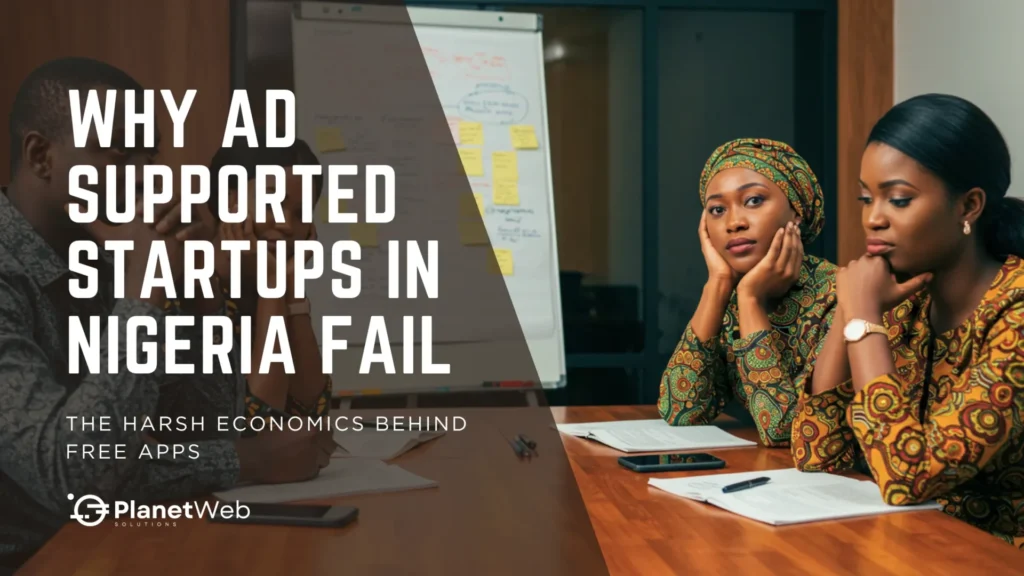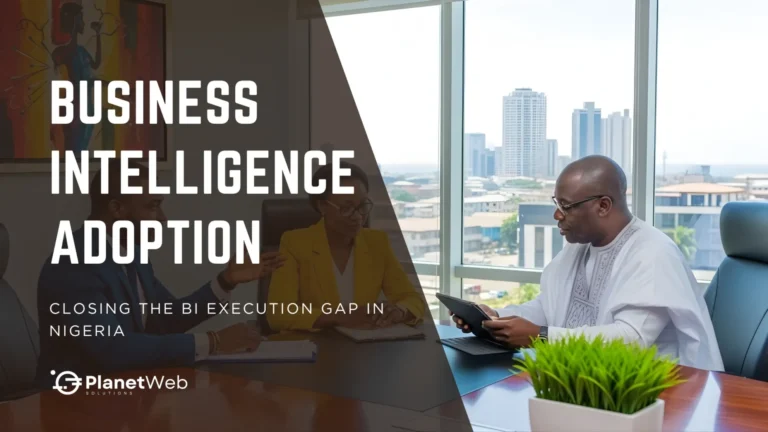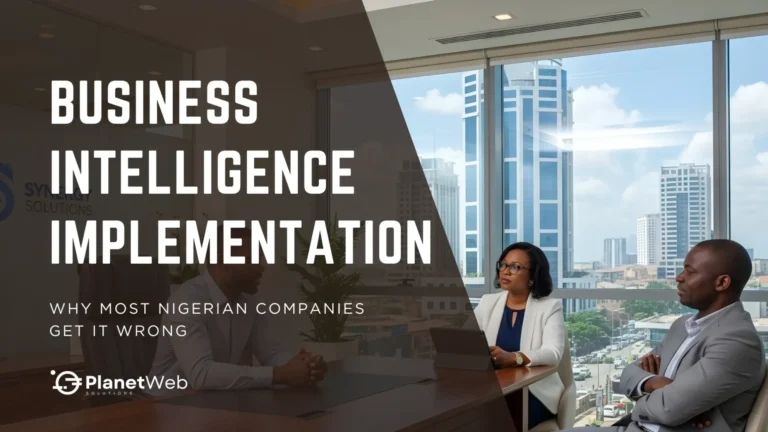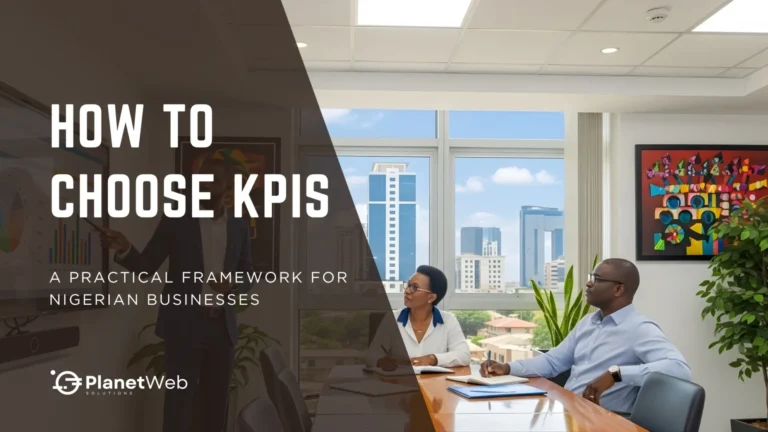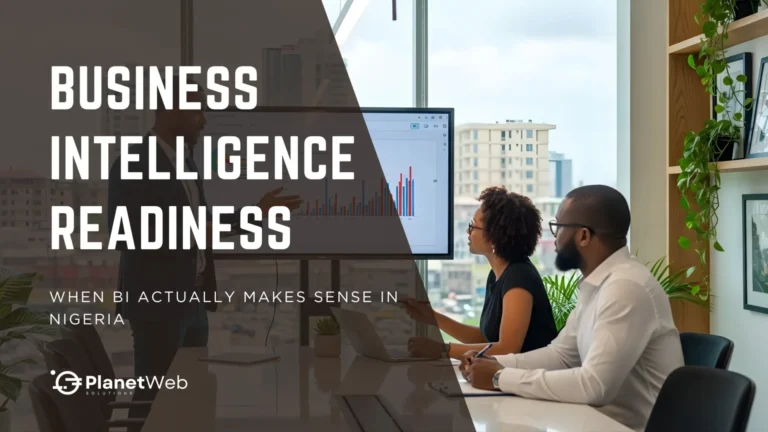The Harsh Truth About Ad-Supported Startups in Nigeria
Introduction: The CPM Dream That Ends in Debt
In Nigeria’s startup playbook, the idea of “build free, monetize later” still lingers, an approach rooted in optimism but one that often underestimates local economic realities. You’ve seen the story: an app hits 100k downloads, the founder gets a few media features, and then months later, silence.
Why? The math was broken from day one.
At a $0.20 CPM (that’s cost per mille, how much advertisers pay per 1,000 ad impressions), you need 5 million impressions to make $1,000 in a month. Keep that number in your head as you read.
Ad-supported startups in Nigeria often chase scale before revenue, but harsh unit economics usually kill the dream before it takes off.
In this article, we unpack five reasons this model fails locally, show the rare cases where ads do work, and outline six smarter paths for Nigerian founders who want real revenue, not vanity metrics. For more context, see our companion reads: Startup Models to Avoid in Nigeria, Why Startups Fail in Nigeria, and 5 Make-or-Break Nigerian Startup Questions.
At a Glance
- CPM reality: $0.10–$0.50
- Break-even bar: ~5–10M impressions/month
- Infrastructure costs: Dollar-denominated, rising with naira depreciation
- Smart models: Freemium, B2B layers, events, sponsored tools
Reality Check: What the Math Actually Looks Like
Before we dive into why this model fails, let’s establish the baseline economics:
CPM Rates in Nigeria:
- Average range: $0.10 to $0.50
- Typical range observed by Nigerian publishers: $0.15 to $0.25
- Premium publishers: $0.30 to $0.50
What You Need to Earn $1,000 Monthly:
- At $0.10 CPM: 10 million impressions
- At $0.20 CPM: 5 million impressions
- At $0.50 CPM: 2 million impressions
Quick math: Monthly revenue = (Impressions ÷ 1,000) × CPM At 2,000,000 impressions and $0.20 CPM, revenue ≈ $400.
Rule of thumb: if you cannot see a path to 5–10 million monthly impressions, ads alone will not pay your bills.
I. Brutally Low CPMs Destroy Unit Economics for Ad-Supported Startups in Nigeria
Average Nigerian CPM ranges between $0.10 and $0.50, depending on traffic quality and ad network. For context, US publishers typically earn $2 to $10 CPM for the same content, which is 10 to 50 times higher.
At $0.20 CPM, every 5 million impressions ≈ $1,000. That is the bar you must clear, monthly, before salaries, marketing, or growth.
Why Nigerian CPMs Stay Low:
Global brands pay less for Nigerian audiences because purchasing power is lower and conversion rates are weaker. The same advertiser might pay $5 CPM to reach American users but only $0.20 to reach Nigerian users.
Many local advertisers lean heavily toward influencer partnerships and offline activations, leaving display ads with a smaller slice of spend. Ad networks prioritize higher-paying markets, so Nigerian inventory fills with low-value remnant ads.
The Infrastructure Cost Mismatch:
Your ad revenue comes in naira (or at Nigerian CPM rates), but infrastructure costs are in actual dollars. Cloud hosting, CDN services, email platforms, analytics tools, and payment processors all bill in dollars.
Even if you drive 5 million impressions monthly and earn $1,000, your AWS bill alone could consume $600-800. You’re left with $200-400 to cover staff, marketing, content creation, customer support, and everything else.
II. Nigerian Users Don’t Engage With Ads: The Behavior Behind Low Yields
Multiple factors converge to make Nigerian users some of the least profitable audiences for ad-based monetization globally.
Opera Mini’s Ad-Blocking Dominance
Opera Mini’s compression and ad blocking mean a big share of Nigerian mobile traffic never renders standard display ads or tracking pixels, suppressing viewability and recorded impressions. For many content sites, that makes a large portion of the audience effectively invisible to advertisers.
In 2023, Opera said its free data campaigns saved Nigerian users nearly ₦5 billion, and its compression tech makes 1.5GB last up to 10x longer.
Low Trust in Digital Advertising
Years of spammy formats and poor targeting have trained users to ignore anything labeled “sponsored,” and click-through rates are often materially lower than global averages.
Data Costs Kill Ad Engagement
A 20GB data plan can consume a meaningful share of monthly income for many households. High data costs encourage ad-avoidance behaviors.
The Data Economics:
- 1GB of data: ₦300-500
- Household income (median): ₦50,000-100,000 monthly
- Data as % of income: meaningful for most households
This creates a vicious cycle: to maximize ad revenue, you need rich media ads. But those same high-value ads drive away users trying to conserve data, reducing impressions and making your inventory less valuable.
Even Legacy Publishers Struggle
Even legacy publishers with millions of monthly visitors increasingly rely on events, sponsored content, and subscriptions, because display ads alone rarely sustain operations.
If platforms with established brands can’t make pure ad models work, the implications for ad-supported startups in Nigeria are sobering.
III. Platform Costs Still Stack Up, in Dollars
Naira depreciation has accelerated the cost crisis. Between 2023 and 2025, the exchange rate moved from roughly ₦460 to over ₦1,500 per dollar (a depreciation of more than 200%). What cost ₦700,000 in 2023 now costs over ₦1.5 million for the exact same service.
Meanwhile, your ad revenue didn’t triple. CPM rates stayed roughly the same in dollar terms, meaning your purchasing power collapsed.
Several Nigerian founders report that switching from global clouds to local providers cut costs significantly, but trade-offs include fewer managed services and reliability gaps. The core problem remains: you earn cents per thousand views while paying dollars for bandwidth, storage, and compute.
Infrastructure Cost Breakdown for a 100,000-User Startup:
| Infrastructure Component | Monthly Cost (Estimated) | Annual Cost |
|---|---|---|
| Cloud hosting (AWS/GCP) | $200-600 | $2,400-7,200 |
| CDN and bandwidth | $100-300 | $1,200-3,600 |
| Database hosting | $50-150 | $600-1,800 |
| Email services | $50-100 | $600-1,200 |
| Analytics and monitoring | $50-100 | $600-1,200 |
| Payment processing fees | $100-200 | $1,200-2,400 |
| Backup and storage | $30-80 | $360-960 |
| Total Infrastructure | $580-1,530 | $6,960-18,360 |
Takeaway: At $0.20 CPM, 500k impressions ≈ $100, which your infrastructure can exceed before you pay a single salary.
Running a video platform for 100,000 users requires transcoding ($200-500 monthly), video hosting/CDN ($300-800 monthly), and storage ($100-300 monthly). Even if you pull ₦500k from 2.5 million impressions (roughly $325), AWS could swallow 80% of that.
This reality makes ad-supported startups in Nigeria particularly vulnerable to currency fluctuations and infrastructure expenses.
IV. Investor Sentiment Has Moved On: The Funding Numbers Don’t Lie
Quick context: SOTIA (State of Tech in Africa) is a twice-yearly report from TechCabal Insights that tracks startup funding across the continent.
According to SOTIA H1 2025, African startups raised $1.42 billion across 243 deals. Where the money went:
- Fintech: $638.8 million (~45%)
- Logistics and supply chain: $287.4 million (20%)
- Healthtech: $156.2 million (11%)
- Telecom, Media & Entertainment: $4.2 million (0.3%)
The Entertainment and Media Funding Collapse:
Funding for media and entertainment plunged across 2021–2024:
| Year | Media & Entertainment Funding | Year-over-Year Change |
|---|---|---|
| 2021 | $87.3M | — |
| 2022 | $59.8M | -31.5% |
| 2023 | $12.4M | -79.3% |
| 2024 | $1.5M | -87.9% |
| 2025 H1 | $4.2M | (partial year) |
That’s a 97.5% collapse from 2022 to 2024. Investors abandoned the sector almost entirely.
What Investors Fund Now:
- Prioritize revenue from day one
- Prefer transaction-tied models
- Tilt B2B over B2C
- Back fintech infrastructure and rails
The message is clear: No revenue, no funding. “We’ll monetize through ads later” is now a disqualifying statement in investor pitches.
This funding drought has cascading consequences for ad-supported startups in Nigeria: talented founders avoid the model, existing startups can’t raise follow-on rounds, and shutdowns accelerate.
Related reads: Startup Burn Rate in Nigeria and Startup Governance in Nigeria.
V. Ad-Supported Startups in Nigeria That Rewrote the Rules
Companies using ad-based models in Nigeria exist, but they have completely reinvented the game.
TechCabal and Nairametrics took 5–7 years to build brand loyalty before advertising became significant. Even then, they layered in events, consulting, subscriptions, and sponsored content. Today, display advertising accounts for less than 40% of their revenue.
Admoni flipped the model by turning ads into currency. Users watch ads in exchange for airtime or data, solving the expensive mobile services problem. Users actively choose to watch because the reward is clear and immediate.
StatEarn lets small businesses advertise via WhatsApp statuses. Users post advertiser content and earn money when contacts view it. This works because people do pay attention to content from friends, not random ad networks.
Sliide Airtime pushes lock-screen content in return for mobile data. Users unlock phones 100+ times daily anyway. By placing content at that moment and compensating with data, they created valuable inventory without requiring active engagement.
S&T Media puts digital screens in fuel stations and retail stores. People waiting at fuel pumps have captive attention for 5–10 minutes, and those who own cars typically have higher purchasing power.
Notice the Pattern: Winners Monetize Behavior, Context, or Captive Attention
Sliide monetizes lock screen behavior. StatEarn monetizes WhatsApp’s high-trust context. S&T Media monetizes scarce captive attention.
They’re not placing banner ads and hoping. They’re building entirely new ad experiences designed around user behavior, local context, and trust dynamics.
These rare survivors show that if ad-supported startups in Nigeria work at all, they must be reimagined from first principles. Even then, challenges remain: low ad spend, high ops costs, messy attribution.
For more: Digital Business Models in Nigeria.
VI. Smarter Monetization Paths for Nigeria
Forget ad pennies. Focus on models with real control and margins:
| Model | Nigerian Example | Why It Works | Revenue Reality |
|---|---|---|---|
| Freemium | Shuttlers (corporate plans) | Companies pay 10x-50x more per user than ads | ₦15,000-25,000 per employee monthly vs. ₦50-100 ad revenue |
| Affiliate/Transactional | Travelstart | Revenue tied to purchases, not traffic | 3-10% of ₦50,000-500,000 = ₦1,500-50,000 per sale |
| B2B SaaS | PiggyVest for Business | Recurring, predictable income | ₦50,000-500,000 monthly per customer |
| Memberships/Courses | Selar creators | ₦5,000 sale = 25,000 ad impressions worth | ₦5,000-50,000 per customer |
| Events/Partnerships | TechCabal’s Moonshot | Sponsors pay for brand association | ₦500,000-5,000,000 per event |
| Sponsored Tools | FMCG calculators | Fixed-fee, avoid volume game | ₦500,000-3,000,000 per project |
These models replace CPM dependence with price control and direct value capture.
The Math Comparison:
To make ₦500,000 monthly:
Ad-based model:
- Need: 2.5 million impressions
- Requires: 300,000-500,000 active users
- Infrastructure: ₦400,000-800,000 monthly
- Net: ₦0-100,000
Freemium SaaS:
- Need: 50 customers at ₦10,000/month
- Requires: 500-1,000 free users at 5–10% conversion
- Infrastructure: ₦50,000-150,000
- Net: ₦350,000-450,000
Digital course:
- Need: 50 sales at ₦10,000
- Requires: 5,000-10,000 audience with 0.5–1% conversion
- Infrastructure: ₦20,000-50,000
- Net: ₦450,000-480,000
Models where you set the price need 10–50x fewer users to generate the same revenue, with better margins.
B2B layers and freemium models often depend on efficient workflow automation to scale profitably. To explore how Nigerian startups scale internationally: Nigerian Startups Going Global.
Conclusion: Build Revenue First, Let Ads Be the Add-On
Nigeria doesn’t give you the volume or ad rates to win the CPM game. The math simply doesn’t work for ad-supported startups in Nigeria:
- CPMs are 10–50x lower than developed markets
- Users block ads, don’t click, and distrust advertising
- Infrastructure costs eat most revenue
- Investors abandoned “monetize later” models
So flip the script: build revenue first. Start with a Selar product, freemium tier, or B2B service. Let ads be the add-on, not the business. Ad-supported startups in Nigeria that succeed are rare, and they never rely solely on ads.
The Path Forward:
- Choose a monetization model where you control pricing
- Build for users who can and will pay
- Keep infrastructure lean until revenue justifies growth
- If you use ads, make them supplementary (10–20% of revenue max)
Traction without revenue is risk with a press release. Build real value, price for sustainability, and let ads support the business, not carry it.
Frequently Asked Questions
Related Reading
Startup Failure & Strategy
- 7 Startup Mistakes in Nigeria You Should Avoid
- Why Startups Fail in Nigeria: Lessons from 2024’s Closures
- Startup Models to Avoid in Nigeria
- 5 Make-or-Break Nigerian Startup Questions
Monetization & Business Models
Growth & Governance
Stay Informed on Nigerian Startup Economics
At PlanetWeb, we track Nigeria’s startup ecosystem and provide honest analysis of monetization challenges, tech policy changes, and what they mean for businesses and founders.
✔ Share this report with anyone building or funding startups in Nigeria
✔ Subscribe to our newsletter for ongoing startup strategy insights
✔ Follow us on LinkedIn or X
What monetization strategies have worked for you in Nigeria? Share your observations in the comments.

